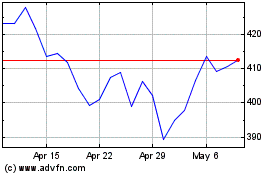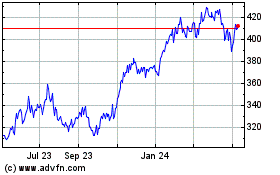Oxford BioMedica Looks to Cut Costs of Gene Therapies With Microsoft Collaboration -- Update
March 12 2019 - 12:27PM
Dow Jones News
--Oxford BioMedica will work with Microsoft to research gene
therapy technology.
--The collaboration aims at reducing the price of a crucial
component some gene therapies.
--Right now, high prices of these therapies are slowing down
their uptake.
By Carlo Martuscelli
Oxford BioMedica PLC (OXB.LN) said Tuesday that it will team-up
with Microsoft Corp. (MSFT) in a bid to use cloud and
machine-learning technology to bring down the price of gene
therapies.
The U.K.-listed company, a spinoff from Oxford university,
specializes in the production of lentiviral vectors, a key
component of certain gene therapies.
It hopes that by working with the U.S. technology giant it can
improve its production process and lower the costs of treatments
that use these specially modified viruses. The lentiviral vectors
deliver select pieces of DNA to cells in order to alter their
genetic code--for example, helping white blood cells target tumors.
This is how Kymriah, a treatment developed by Novartis AG (NOVN.EB)
which uses Oxford BioMedica's components, works.
The U.K.'s National Institute for Health and Care Excellence
recently approved Kymriah for use by the country's public
health-care system. But while these cutting-edge treatments, known
as CAR-T therapies, can often have impressive outcomes from a
therapeutic perspective, price has been a sticking point. The end
result is that sales have been slower than hoped.
Kymriah has a U.S. list price of between $373,000 and $475,000
per patient, depending on the type of cancer.
Jason Slingsby, chief business officer at Oxford BioMedica, said
that the research collaboration aims at lowering the price of these
life-saving therapies by industrializing the manufacture of
lentiviral vectors. The hope is to scale up production from a
hundred doses of therapy per batch, to thousands, he said.
This will be accomplished by running massive parallel
experiments in order to isolate the most promising cell lines that
serve as a kind of "factory" for the lentiviruses. Another U.K.
company, Synthace, will use its specially built software to
automate the process and minimize time-consuming human
intervention. Then machine-learning technology will help comb
through the massive data sets produced to isolate promising
results.
The research collaboration has an initial two-year term which
can be extended said Mr. Slingsby. The company declined to reveal
the financial terms of the deal.
Write to Carlo Martuscelli at carlo.martuscelli@dowjones.com
(END) Dow Jones Newswires
March 12, 2019 12:12 ET (16:12 GMT)
Copyright (c) 2019 Dow Jones & Company, Inc.
Microsoft (NASDAQ:MSFT)
Historical Stock Chart
From Apr 2024 to May 2024

Microsoft (NASDAQ:MSFT)
Historical Stock Chart
From May 2023 to May 2024
